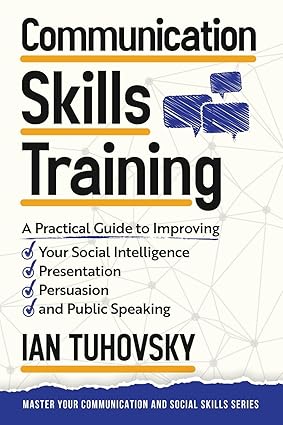Communication Skills: A Practical Guide to Improving Your Social Intelligence, Presentation, Persuasion, and Public Speaking
1. Introduction
Effective communication is a cornerstone of personal and professional success. This white paper explores key principles and practical strategies outlined in "Communication Skills: A Practical Guide to Improving Your Social Intelligence, Presentation, Persuasion and Public Speaking" (and similar resources), focusing on enhancing social intelligence, mastering presentation and persuasion techniques, and developing strong public speaking abilities.
2. Social Intelligence: The Foundation of Effective Communication
- Understanding Self:
- Self-awareness: Recognizing one's strengths, weaknesses, emotions, and impact on others.
- Self-regulation: Managing emotions, impulses, and behaviors effectively.
- Self-motivation: Driving oneself towards goals with passion and perseverance.
- Understanding Others:
- Empathy: Understanding and sharing the feelings and perspectives of others.
- Social awareness: Perceiving and interpreting social cues, group dynamics, and organizational culture.
- Building Relationships:
- Effective listening: Actively listening to others, demonstrating empathy, and asking clarifying questions.
- Building trust: Establishing rapport and fostering genuine connections with others.
- Influencing others: Persuading and influencing others effectively while maintaining ethical and respectful communication.
3. Mastering Presentation and Persuasion
- Crafting Compelling Presentations:
- Structure and Storytelling: Organizing presentations with a clear structure, using storytelling techniques to engage the audience.
- Visual Aids: Utilizing visuals (slides, charts, videos) effectively to enhance understanding and engagement.
- Delivery Techniques: Mastering vocal variety, body language, and stage presence.
- Persuasive Communication:
- Understanding Audience Needs: Tailoring your message to the audience's interests, needs, and perspectives.
- Building Credibility and Trust: Establishing credibility through expertise, experience, and ethical communication.
- Using Persuasive Techniques: Employing techniques such as storytelling, emotional appeals, and logical arguments to influence others.
- Handling Objections: Effectively addressing and overcoming objections and counterarguments.
4. Developing Public Speaking Skills
- Overcoming Stage Fright: Developing techniques to manage anxiety and build confidence in public speaking situations.
- Engaging with the Audience: Maintaining eye contact, using appropriate body language, and actively involving the audience.
- Effective Q&A Sessions: Preparing for and effectively handling questions from the audience.
- Practicing and Refining: Regular practice and constructive feedback are crucial for improving public speaking skills.
5. Communication in the Digital Age
- Written Communication: Mastering professional writing skills, including email, reports, proposals, and presentations.
- Digital Communication: Effectively utilizing social media, online platforms, and other digital communication channels.
- Online Presence: Building and maintaining a positive online presence through professional social media profiles and online interactions.
6. Use Cases
- Business Professionals: Effective communication is essential for career advancement, from giving presentations to clients to negotiating contracts and building relationships with colleagues.
- Educators: Effective communication is crucial for engaging students, delivering clear instructions, and fostering a positive learning environment.
- Leaders: Strong communication skills are essential for motivating teams, inspiring others, and effectively leading organizations.
- Sales and Marketing Professionals: Effective communication is key to building relationships with clients, closing deals, and promoting products or services.
7. References
- "Crucial Conversations: Tools for Talking When Stakes Are High" by Kerry Patterson, Joseph Grenny, Ron McMillan, and Al Switzler1
- "How to Win Friends and Influence People" by Dale Carnegie
- "The 7 Habits of Highly Effective People" by Stephen R. Covey
- "Presentation Zen" by Garr Reynolds
- "TED Talks" (for inspiration and best practices in public speaking)
- Communication Skills Training Programs: (e.g., Dale Carnegie Training, Toastmasters International)
8. Conclusion
Effective communication is a multifaceted skill that requires continuous learning and development. By focusing on self-awareness, understanding others, mastering presentation and persuasion techniques, and developing strong public speaking skills, individuals can significantly enhance their personal and professional lives.
Disclaimer: This white paper provides a general overview of communication skills and their importance. The specific techniques and strategies will vary depending on individual needs and contexts.
This information is for general knowledge and informational purposes only.



